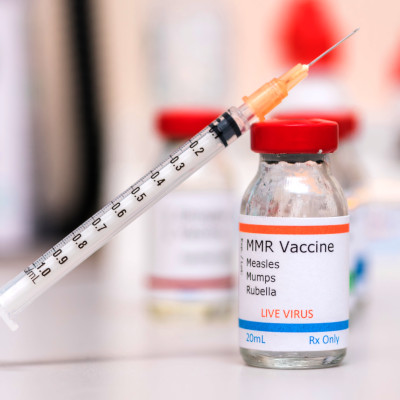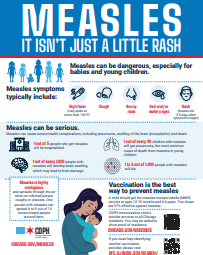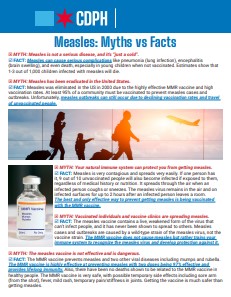Measles: Get The Facts

Current Measles Situation in Chicago
In 2025, there are a total of 10 confirmed measles cases in Illinois. One case in a Chicago resident and one case in a suburban Cook County resident were confirmed during April 2025. Learn more about these two cases in this press release.
At this time, the risk of measles to the general public in Chicago remains low. However, all Chicagoans should be alert for signs of measles, including fever and rash, especially after international travel. Residents are encouraged to review their immunization records or contact their health care provider to make sure they are up to date on the measles, mumps, and rubella (MMR) vaccine.
Community Exposure Locations
CDPH and partners have identified the following exposure locations in public settings for which a list of exposed people cannot be obtained:
There are no current exposure locations.
Identified exposure locations in Illinois, outside Chicago, are available on the>IDPH measles exposure locations webpage.
If you were at a location listed during the date and time above, review your immunization records or contact your healthcare provider to make sure you are up to date on the measles, mumps, and rubella (MMR) vaccine. Immunization records recorded in the Illinois immunization registry can be accessed using the Illinois Department of Public Health Vax Verify portal. If you or your child have not received your measles vaccinations, you are at higher risk of being infected with measles and you should monitor yourself for 21 days after exposure. Children under 5 years of age, people with compromised immune systems, and pregnant people are at higher risk for severe disease and complications from measles.
People who may have been exposed to measles should:
- Monitor themselves for symptoms of measles.
- Symptoms include rash, high fever, cough, runny nose and red, watery eyes.
- After exposure to someone with measles, symptoms can take from 7 to 21 days to show up.
- People who develop symptoms of measles should stay home and away from others.
- Contact a health care provider by phone BEFORE going to a medical office or emergency department, unless you are experiencing a medical emergency. Special arrangements can be made for your evaluation while also protecting other patients and medical staff from possible infection.
About Measles
What is measles?
Measles is a highly contagious viral infection that commonly causes a rash and fever. Measles can be dangerous, especially for babies and young children under the age of 5. Adults over 20 years of age, pregnant women, and people with compromised immune systems are also more likely to suffer from measles complications. Common complications include ear infections, croup, and diarrhea. Severe complications from measles infections can include pneumonia (a serious lung infection), encephalitis (swelling of the brain), deafness, and other long-term consequences. About 1 in 5 people in the U.S. who get measles will be hospitalized. In rare cases, measles can be deadly.
Measles was declared eliminated from the U.S. in the year 2000 due to a highly effective vaccination program. However, measles remains common in many parts of the world. Outbreaks can occur in the U.S. if measles is brought into the United States by unvaccinated travelers, including both Americans and foreign visitors, who get measles while they are in other countries.
What are symptoms of measles?
Measles typically starts with cough, runny nose, red eyes, and a fever that can get very high. Three to five days after these symptoms begin, a rash will appear. The rash looks like tiny, red spots that start at the head and spread down to the rest of the body.
Photos of the measles rash can be found here: https://www.cdc.gov/measles/signs-symptoms/photos.html
How is measles spread?
Measles is very contagious and spreads through the air when an infected person coughs or sneezes. You can catch measles just by being in a room where a person with measles has been, even up to 2 hours after that person has left. Infected people can spread measles to others four days before until four days after the rash appears. Someone who has not had the measles, mumps, and rubella vaccine (called the MMR vaccine) or a prior infection is highly likely to get measles if they are exposed to the measles virus.
How can I protect myself and my child?
The best protection from measles is the measles, mumps, and rubella (MMR) vaccine. Two doses of the MMR vaccine are 97% effective at preventing measles. The MMR vaccine provides long-lasting protection against measles.
Doctors recommend that most children get the first dose of the MMR vaccine at the age of 12 to 15 months and a second dose at 4 to 6 years of age. The MMR vaccine protects your child from measles, and also against mumps and rubella. Adults who are not sure if they have had the vaccine or if they had a prior measles infection should contact their medical provider.
Who needs MMR vaccination before travel?
Prior to international travel or travel to part of the U.S. with a measles outbreak, all adults and children over 1 year of age should receive 2 doses of the MMR vaccine separated by at least 28 days. Infants 6-11 months of age should receive an early MMR dose prior to traveling internationally; for infants 6-11 months traveling to a part of the U.S. with a measles outbreak, this early dose should be considered as well. Of note, infants who receive an early MMR dose will still need 2 additional doses of MMR after 1 year of age. Talk with your health care provider about protecting yourself and your child as soon as you know your travel plans. Infants who are too young to be vaccinated should avoid contact with sick people or situations where they may be exposed to sick people.
Visit https://www.cdc.gov/measles/plan-for-travel.html or download the MMR travel recommendations documents for more information.
What should I do if I have been exposed to someone with measles?
If you have been exposed to someone who has measles, you should immediately call your healthcare provider and let them know. Your healthcare provider can determine if you are immune and can make special arrangements to evaluate you without putting other patients or medical staff at risk.
If you are not immune to measles, receiving the MMR vaccine within 3 days of exposure or a medicine called immune globulin within 6 days of exposure may help reduce your risk of developing measles. Your healthcare provider can advise you about whether these are necessary. It is important to call your healthcare provider as soon as you know you were exposed to measles since the vaccine or immune globulin need to be given within a certain timeframe.
If you are not immune to measles and do not get the MMR vaccine within 3 days of exposure, you should stay home and quarantine for 21 days after exposure to ensure that you do not get others sick.
What is the risk of measles in Chicago?
The City of Chicago has a high measles, mumps and rubella (MMR) vaccination rate, meaning that most children and adults in Chicago are vaccinated and protected. However, some children under the age of 12 months or people with weakened immune systems may not be able to receive the vaccine. Since 2011, there have been several confirmed cases of measles in Chicago, largely related to international travel. Travelers returning to Chicago from areas experiencing ongoing measles outbreaks, both in the U.S. and abroad, might be at risk of spreading measles within the city if they are unvaccinated.
Residents are encouraged to review their immunization records or contact their health care provider to make sure they are up to date on MMR vaccine. Immunization records recorded in the Illinois immunization registry, Illinois Comprehensive Automated Immunization Registry Exchange (I-CARE), can be accessed using the Illinois Department of Public Health Vax Verify portal.
Doctors recommend that most children get the first dose of the MMR vaccine at the age of 12 to 15 months and a second dose at 4 to 6 years of age. MMR vaccine is available at most doctor’s offices and pharmacies. Illinois children as young as 7 years-old can get vaccinated at pharmacies under Illinois law. CDPH Immunization clinics provide MMR vaccine for no out-of-pocket cost to any child 0–18 years and uninsured adults 19 and older.
Is the MMR vaccine safe?
Yes. The MMR vaccine is very safe and it is effective at preventing measles (as well as mumps and rubella). Most children do not have any side effects from the MMR vaccine. If side effects do occur, they are usually mild and can include fever, pain or redness where the vaccine was given, or mild rash.
For more information, please visit https://www.cdc.gov/vaccine-safety/vaccines/mmr.html.
Is there a link between the MMR vaccine and autism?
No. Scientists in the United States and other countries have carefully studied the MMR vaccine and have found no link between autism and the MMR vaccine.
What should I do if I am unsure whether I am immune to measles?
If you are unsure whether you or your child has received the MMR vaccine, contact your healthcare provider to discuss your or your child’s immunization records. Immunization records recorded in the Illinois immunization registry, Illinois Comprehensive Automated Immunization Registry Exchange (I-CARE), can be accessed using the Illinois Department of Public Health Vax Verify portal. If you do not have a healthcare provider, you can call 311 or visit www.chicago.gov/health to locate a CDPH walk-in immunization clinic where MMR vaccine is provided for no out-of-pocket cost to any child 0–18 years and uninsured adults 19 and older.
Measles Resources






